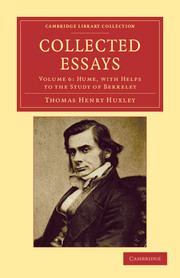
-
Select format
-
- Publisher:
- Cambridge University Press
- Publication date:
- November 2012
- December 2011
- ISBN:
- 9781139149259
- 9781108040563
- Dimensions:
- Weight & Pages:
- Dimensions:
- (216 x 140 mm)
- Weight & Pages:
- 0.43kg, 340 Pages
You may already have access via personal or institutional login
Book description
Known as 'Darwin's Bulldog', the biologist Thomas Henry Huxley (1825–95) was a tireless supporter of the evolutionary theories of his friend Charles Darwin. Huxley also made his own significant scientific contributions, and he was influential in the development of science education despite having had only two years of formal schooling. He established his scientific reputation through experiments on aquatic life carried out during a voyage to Australia while working as an assistant surgeon in the Royal Navy; ultimately he became President of the Royal Society (1883–5). Throughout his life Huxley struggled with issues of faith, and he coined the term 'agnostic' to describe his beliefs. This nine-volume collection of Huxley's essays, which he edited and published in 1893–4, demonstrates the wide range of his intellectual interests. In Volume 6, Huxley focuses on the philosopher David Hume (1711–76), discussing his life and his philosophical and intellectual work.
Contents
Metrics
Full text views
Full text views help Loading metrics...
Loading metrics...
* Views captured on Cambridge Core between #date#. This data will be updated every 24 hours.
Usage data cannot currently be displayed.
Accessibility standard: Unknown
Why this information is here
This section outlines the accessibility features of this content - including support for screen readers, full keyboard navigation and high-contrast display options. This may not be relevant for you.
Accessibility Information
Accessibility compliance for the PDF of this book is currently unknown and may be updated in the future.


